#greek authorities
Explore tagged Tumblr posts
Text
Last summer, a shocking video of asylum seekers cable-tied and blindfolded in the back of a van on a Greek holiday island went viral online. At the time, the veracity of the video was questioned and Theodosis Nikitaras, the mayor of Kos, filed a defamation case against the NGO that published it. Now, new documents obtained from the European Border and Coast Guard Agency (Frontex) confirm the incident and pin the responsibility on individuals it describes as “likely working in concert” with Greek authorities. The 44-second video was published by the Aegean Boat Report NGO on June 26, 2023, the same day the incident took place. Since then, it has been seen by more than 660,000 people on X. The NGO, which regularly reports allegations of human rights abuses at Greece’s sea borders with Turkey, said it had received the video from the people inside the van. They included a child and many of them were Palestinians having arrived as asylum seekers from Turkey to Kos. One woman had managed to conceal a phone in her bra and contacted the NGO via WhatsApp pleading for help. In a video she sent, the people are told to “shut up” in Greek by two unidentified men in the van after asking for the toilet. There were 13 people in the van in total, according to Frontex.
continue reading
0 notes
Text
Creating The Mythology For Writing
This is the topic that @melda0m3 has request of me with the specific quote as: "How to write legends about gods? I have my whole god system and their basic lore, but can never figure out how to make legends and such"
So, following this advice post, I will only be talking about how to create legends for your established gods and I will not be talking about how to create gods.
Writing Legends
Legends, as defined by a quick google searchl, are a traditional story sometimes popularly regarded as historical but unauthenticated.
Legends are also classified as myths since myths are traditional stories that were meant to explain a physical or social phenomena.
For example, the "marriage" between Hades And Persephone was meant to explain seasons as Demeter(the goddess of harvest) destroyes all the plants when Persephone is in the underworld for six months.
Using the real-life reason for legends and myth exist can help provide a clearer, more concise, guideline to make use of.
Of course, your characters won't discuss every single legend within the story so you need to write the legends which will be noteworthy to the plot.
For example, you can highlight the mythology that explains why your characters have inhuman characteristics and why {SOMETHING} is happening.
However, mythology doesn't only exist around the natural. Legends are also weaved around battles, important individuals, and other such things.
This is due to the fact that legends are often the most influencial piece of propaganda within the world. Legends often serve to disparate certain communities within a conflict as failing to win the cover of God.
However, this propaganda also serves to paint certain individuals in an almost heavenly light where their ability to present themselves as a seemingly supernatural creature provides untold benefits for them. A real-life example of this is the Legend of King Arthur.
HOW IS IT APPLICABLE FOR YOU(Story Ideas) ?
Characters have a vested interest in making themselves appear better than they actually are. They may attempt to utilize legends in order to appear like they are God's favorite child.
Countries have a desire to always appear victorious and idealized. This can create it's own sort of reflection chamber where exaggerate stories of grandeur can create a mutation of beliefs so profound that when your characters step outside of the country, reality is vastly different.
Gods are the most likely to manipulate legends to cast their enemies in an unlikeable light while portraying themselves as perfect. This can lead to a highly complicated hodge-podge of contradictory information.
I hope I did well by you @melda0m3 :)
#writing#writeblr#on writing#creative writing#writing advice#writers on tumblr#writers#writerscommunity#writers and poets#writers life#writer stuff#writer#author#amwriting#greek mythology#mythology and folklore#story ideas#writing inspiration
404 notes
·
View notes
Text
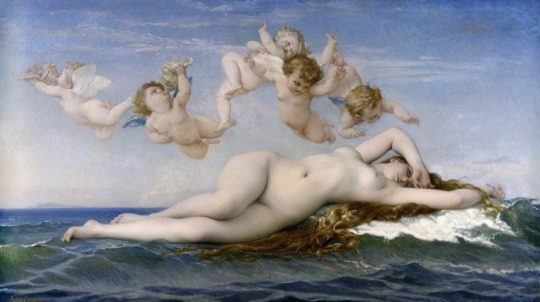
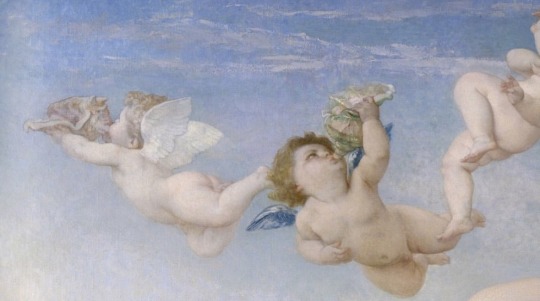
The Birth of Venus (painting), 1863.
by Alexander Cabanel.
#bookish#book review#reading#books#poetry#authors#book blog#booklr#writing#studyblr#book worm#books & libraries#greek mythology#history#art#art history#art blog#art gallery#art aesthetic#english literature#english#vintage#dark academia#academia#light academia#cottagecore#aesthetic#education#punk academia#mythology
818 notes
·
View notes
Text
Hyacinth grinned with a queer, juvenile delight. He placed a light hand upon Apollo's lean shoulder, bringing his lips toward the god's ear in the very same motion.
"My god." He murmured, "My Apollo."
He giggled, "Oh, look what I'm becoming... It's you. Your influence."
Apollo hummed, smiling warmly in return.
"Yes," He began to reason, "The influence of my melodic words and ever so endearing charm."
"Or perhaps of your perfect posture and flawless physical state."
"What, if I may ask, does my posture consequence?"
"Just..." Hyacinth's tanned face split in a grin, "Just take the compliment, dear."

Masterlist
#writing#my writing#apollo and hyacinth#apollo and hyacinthus#apollo#hyacinth#hyacinthus#greek myth#greek mythology#greek gods#writeblr#writblr#writers of tumblr#authors of tumblr#writer#author
284 notes
·
View notes
Text
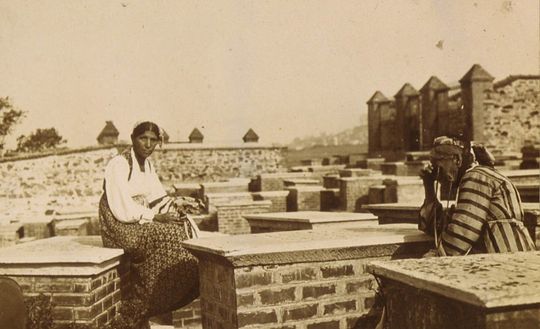
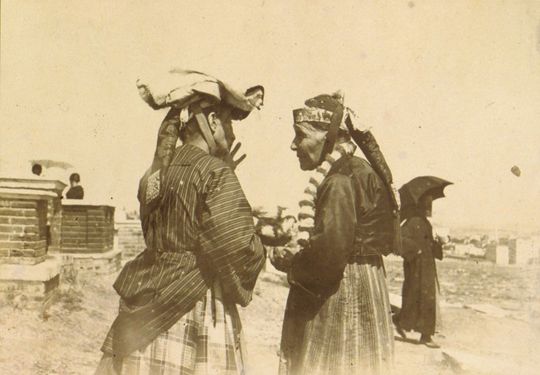
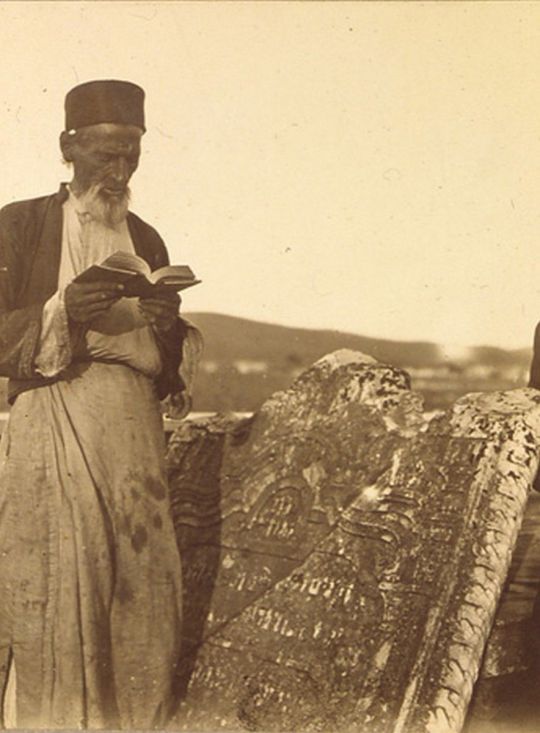
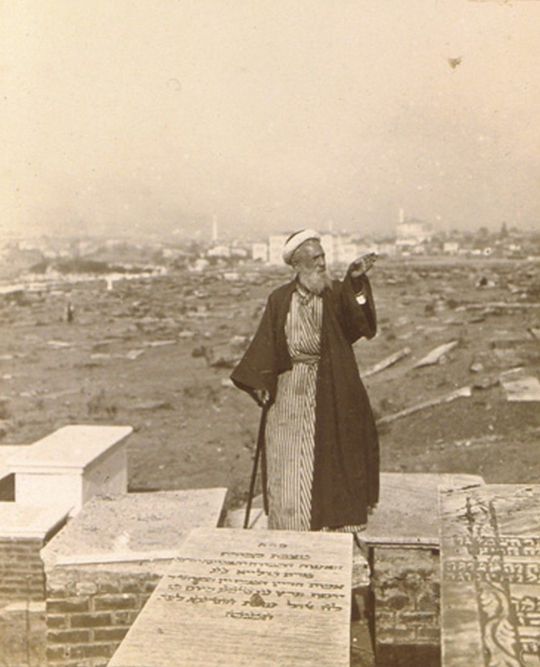
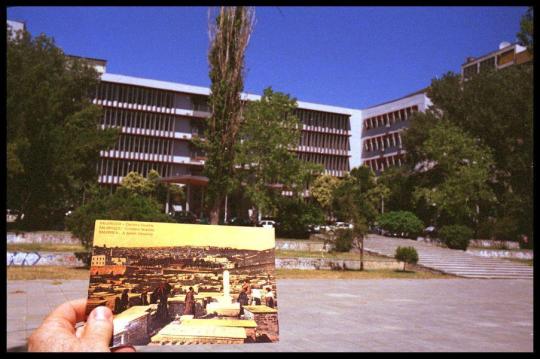
Sephardic Jews from Thessaloniki in their traditional costumes, in the city’s old cemetery, before the war // a contemporary photo that shows where the destroyed cemetery once was, which is now Greece's largest university, built partially on top of and with land and materials (particularly tombstones) stolen from the razed site.
Thessaloniki or Salonika, once referred to as “the Jerusalem of the Balkans” due to its Ladino-speaking Jewish majority, saw roughly 96% of its Jewish population murdered during the Holocaust. This mass destruction extended to the city's Jewish cemetery, which had been the country's largest, established in the 15th century and housing hundreds of thousands of Jewish graves until its razing by city authorities who had long desired to repurpose the land and resented the inconvenience of Jewish presence. Despite its large-scale destruction during German occupation in 1942, which was initiated and carried out primarily by Thessaloniki authorities with Nazi consent and arrangement, some parts of the cemetery survived intact as late as 1947. Many tombstones were subsequently appropriated and used by city authorities and the Greek Orthodox Church. After the war, people were still carrying away Jewish gravestones each day and regularly looting the cemetery in search of valuables. The city's officials, led by their mayor, completed the cemetery's destruction and sold the tombstones to contractors for use as building materials in various projects; as such many were and are still found in various walls, roads, structures, and churches around the city. A 1992 commemorative book pictures Greek schoolgirls playing Hamlet with skulls and other bones they found in the cemetery.
“[T]he ‘rape’ of the cemetery escalated, marble flooded the market, and its price plummeted. Jewish tombstones were stacked up in mason’s yards and, with the permission of the director of antiquities of Macedonia and overseen by the metropolitan bishop and the municipality, used to pave roads, line latrines, and extend the sea walls; to construct pathways, patios, and walls in private and public spaces though out the city, in suburbs such as Panorama and Ampelokipi, and more than sixty kilometers away in beach towns in Halkidiki, where they decorated playgrounds, bars, and restaurants in hotels; to build a swimming pool – with Hebrew-letter inscription visible; to repair the St. Demetrius Church and other buildings...” Devin Naar, Jewish Salonica: Between the Ottoman Empire and Modern Greece
Most of the efforts to return found tombstones throughout the city are led by Jews, particularly Jacky Benmayor, the curator of the Jewish Museum and last Ladino speaker in Greece, who has personally recovered hundreds of tombstones including his own family's. Surviving Greek Jews never received compensation for the confiscation of the land under the destroyed cemetery, upon which now partially rests Greece's largest university, Aristotle University, which also used Jewish gravestones as building material for its long-coveted expansion finally made possible by the dispossession and annihilation of the city's Jews. In 2014, 72 years after the cemetery's destruction and appropriation, a small memorial was established on campus grounds to acknowledge the Jewish cemetery the school is built on and with; the ceremony just 10 years ago involved the first-ever acknowledgement of the atrocities and apology from a Thessaloniki mayor. The memorial has been vandalised multiple times since its establishment.
#jumblr#jewish#jewish history#jewish photography#sephardic#holocaust#salonika#my posts#greece#don't feel very coherent about this one. doesn't a country's biggest university being built on and with jewish graves just say it all#72 years of silence and then a small memorial subject to frequent vandalism btw#this is the 'compensation' greek jews got#from an annihilation that didn't even spare the dead. a near-total obliteration of life and memory#the memorial pisses me off a little bc it's deliberately vague about very key local participation in these atrocities#reading it you wouldn't know they were mostly driven by local authorities; just facilitated and finally made possible by the nazis#but I do think about what it says a lot:#'but people were not enough. they wanted to kill the memory too.'#and wasn't that true? of both nazis and neighbors?#I really recommend devin naar's work for anyone further interested in this subject
225 notes
·
View notes
Text
Hymn to Womanly Dionysos
I praise the God who runs with wild women, She who takes joy in their forms, Who Herself bears long hair, soft skin, delicate lashes, Dionysos of womanly epithets, Who wore long dresses in Her youth. I praise Dionysos who runs with the Maenads, Who surrounds Herself with ever-present holy wild women, Reveling in their company, Dancing under the sacred darkness at night, By day feasting on wine and honey and milk. Come to me now, O gently blessed one, Whether Your head is laid in the lap of Your beloved wife Ariadne, Who traces Your lips with Her own gentle hands, Or whether You are lying in flowered meadows with maenads, Who themselves rejoice in Your feminine form. Bless me with an ever-present sense of peace, Bless me with the love of women, Bless me with perfect joy in my own gender. May Your gentle cow-like eyes always behold me with kindness, May Your hands hold mine when I sorrow, And when the world raises a hand against me, May I hide behind Your flowing skirts, And may Your thyrsos be raised in my defense.
#definitely a pretty personal prayer#partially based off of a chapter in The God of Ecstasy where the author suggested that the maenads were based on ancient Greek choruses...#...of lesbians#anyways happy pride Dionysos is lesbian today#dionysian#dionysos#dionysus#hellenic polytheism#hellenic polytheist#dionysos deity#dionysus deity#hellenic pagan#hellenic gods#hellenism#sorry for the radio silence i've been dealing both with my grad party and a family emergency
263 notes
·
View notes
Note
Why is Hera so hostile to Leto in a manner that she isn't with the other lovers of Zeus? I can't think of any other woman who was targeted so much by Hera. One could say she didn't want Leto to give birth because her children would be a competition to Hera's children, but why bother her even after she had already given birth? Is it because Leto herself is also a threat to Hera?
Sort of I guess?
I don't think Leto would ever be a threat to Hera's role as the queen of the gods but Hera might see her as a competitor for Zeus' affection, even though I think Zeus would not marry someone else and replace Hera.
The twins are definitely a big reason why Hera begrudged Leto - it is outright stated in the Callimachus Hymn to Delos that the reason Hera especially targeted Leto was because she was told that Apollo would be dearer to Zeus than Ares is. Zeus is very proud of Artemis as well. As he himself puts it, he doesn't mind facing Hera's wrath for children like her.
But the continued hatred even after the birth of the twins (like sending Tityus to rape Leto) could have been for different reasons. This wasn't like one of those affairs Zeus would have with mortal women where he'd leave them behind once the child is conceived. Neither could Hera, despite her many attempts, get rid of Leto like she did with the other lovers. Not only did Leto give Zeus children that he loves dearly, she also stayed on Olympus despite Hera's hatred towards her (which isn't directed to any of Zeus' other divine mistresses, btw). It might have also been because Leto herself is dear to Zeus, if the way she's treated on Olympus is any proof. In the Homeric hymn to Apollo, Leto stands next to Zeus - in the Olympian assembly - to welcome their son. Hera is completely absent from the scene, as if Leto had taken her place even if temporarily. Now you could say this is because Apollo himself is such a powerful and glorious son in a way that no other son of Zeus is, so of course Leto would get such an honor (the hymn itself presents it this way).
But here's another instance - in the Iliad, when Hera goes to seduce Zeus, he is obviously very smitten but before getting into the action, he lists some of his lovers (I believe these were his favorite lovers, as a lot of others are not mentioned):
"for never has such desire for goddess or mortal woman so gripped and overwhelmed my heart, not even when I was seized by love for Ixion’s wife, who gave birth to Peirithous the gods’ rival in wisdom; or for Acrisius’ daughter, slim-ankled Danaë, who bore Perseus, greatest of warriors; or for the far-famed daughter of Phoenix, who gave me Minos and godlike Rhadamanthus; or for Semele mother of Dionysus, who brings men joy; or for Alcmene at Thebes, whose son was lion-hearted Heracles; or for Demeter of the lovely tresses; or for glorious Leto; or even for you yourself, as this love and sweet desire for you grips me now.’ (Book 14, trans. A. T. Murray)
Notice how when talking about most of them, he also mentions the children they bore to him but when Demeter and Leto are mentioned, he doesn't bring up their children at all despite them being some of the most accomplished kids of his. What's more, he takes Leto's name just before Hera's. I mean, this is an interpretation but it looks like not only did Zeus love Leto the most out of all his mistresses - giving her a place second to that of his wife, but also his love for her wasn't necessarily only because she gave him two amazing children.
Nonnus does something similar in the Dionysiaca (but this time Zeus is enamored with Persephone instead of Hera) but more notably, when Typhoeus attacks Olympus and Zeus is discouraged, Nike takes the form of Leto to encourage him and it's pretty telling of what Leto meant to Zeus.
One interesting similarity between Hera and Leto is that they both had a giant try to rape them. Porphyrion tried to violate Hera (Zeus inspired him to do this) and Tityus tried to violate Leto (upon Hera's order). Though both of them were killed, only Tityus got an eternal punishment in Tartarus of having his liver/heart eaten out by vultures so Zeus seems to have taken a greater offense at Tityus trying to assault Leto.
Again, I don't think Zeus would ever take anyone other than Hera as his permanent wife - she is irreplaceable to him. There's an entire myth about Hera leaving him and Zeus winning her back. Their relationship is obviously complex and involves all kinds of emotions including love and hate. But Leto is continually dear to him as well and that's something Hera can't do much about.
#Zeus#Hera#Leto#if you think about it Leto is like the opposite of Hera#she is a great mother#she bore children that Zeus is actually proud of#she never rebels and even begs for forgiveness when her son rebels against Zeus#she's generally mild natured and never lashes out#also if you look into this obscure myth of how Hera established an altar in the name of Leto#because Leto's name was used to cover up the secret relationship between Zeus and Hera#(which kinda sorta implies that Zeus was *maybe* courting or even married to Leto at that time)#it all gets even more complicated for both Hera and Leto#ALSO in the texts that record the syncretism bw Greek and Egyptian gods#Some authors make Hera the mother of Apollo#and Leto was Apollo's nurse#Those texts also mention that this Apollo defeated Typhoeus and became the king of Egypt#So he was like the ideal son of Zeus and Hera#And it's so interesting to me#how this Apollo - the perfect son of Hera - transitioned into a sort of rival figure to Hera in the greek myths#and Typhoeus who was defeated by Hera's son became the son of Hera in the Greek myths#on a different note#to this day I can't understand why Zeus would inspire Porphyrion to do such a thing#was it to get back at Hera for the Tityus incindent?#I shall headcanon it that way (even though I prefer to ignore this version)#well of course not that Zeus would have ever let Porphyrion actually have his way with Hera regardless of the reason#but yeah that was such move and it's wild that the mythographer didn't tell us that reason behind Zeus' action#I've also seen people hc that it was because Zeus wanted Heracles to save Hera so that she's accept him finally#which is also an interesting explanation#especially if you consider that Heracles was also given Hera's breast milk (without her consent)#anyway that's enough rambling ig
124 notes
·
View notes
Note
Why is Asclepius associated with Hermes? Not heard about that before.
It's because the first time I read the birth of Asclepius, I read the version where it was Hermes who saved him (cutting Asclepius out from his mother's womb) from Apollo's wrath. I know now the most common version is Apollo decided to save the baby after having Artemis kill the mother, but the first version stuck with me. I also liked the idea that Asclepius' staff commonly been misidentified with the caduceus (Hermes' staff). So, I thought it could be funny if they looked similar to each other, like a nod to that.
#asks#greek mythology#Asclepius#I know the version with Hermes saving Asclepius is an Ovid version but I know there is another from a different author. I don't remember wh
120 notes
·
View notes
Text
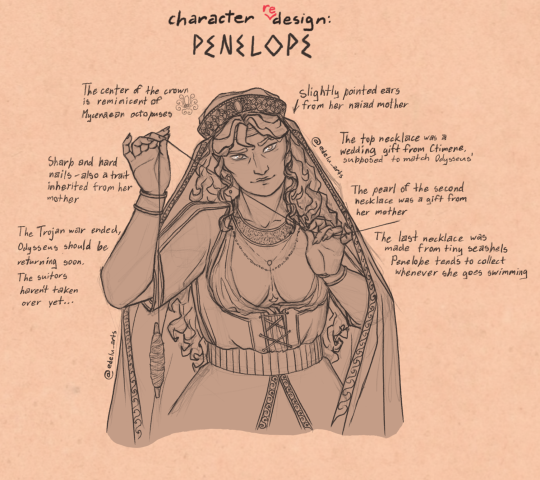
Really happy with how she turned out! I decided to give her some naiad features, inspired by this post and it was really fun! I hc that she can breathe underwater (even though she doesn't have gills. Do naiads have gills?), although I am not sure if she can do it freely or for a limited amount of time 🤔
The fabric piece covering her chest was loosely inspired by 18th century neckerchiefs, because I wasn't sure how the Mycenaean open chest fashion would fly with the censorship here or on other platforms ¯\_(• ▽ •;)_/¯
#I can leave comments and reblog posts again#yay#the odyssey#tagamemnon#penelope#character design#my art tag#I hc that she took over Odysseus' duties while he was away and got to be a reigning queen for about 10-13 years#until the suitors took over. It's a pretty long rant and I can't fit it into tags#this is her design before that#her being a ruler wouldn't really have been possible by Homer's time because of how the ancient Greece treated women#but since the story was set in Mycenaean Greece... maybe? Just maybe she could have enough authority for the assembly to take her seriously#epic the musical#epic the musical fanart#greek mythology#maybe this hc would change as I learn more things about history#but for now it's here ¯\_(ツ)_/¯
487 notes
·
View notes
Text
Note to self: DON'T do a find/change for spelling out numbers under 20 … if there's a cyberpunk story in the anthology. One with numbers-instead-of-letters silliness.
That was a near miss. I almost turned H4des into Hfourdes, and that would NOT do.
#adventures in formatting#indie author life#very proud of that cyberpunk Greek myth story#it would be a shame to ruin it#Shatterlore: Myths of Past and Future#so close to done with the formatting#and the cover art is done#nearing the finish line#can't wait
78 notes
·
View notes
Text
Even though there’s not a single myth on it, I’d like to think Aphrodite couldn’t give a shit about her sexuality.
She gets bored one day, and particularly curious, and heads down to earth. As she wanders around the markets in her mortal disguise, her attention is caught by a kind woman buying apples. Aphrodite wanders over, curious. She’s so beautiful, not so much that she challenges the goddess’ beauty, obviously, but she’s got these delicate features mixed with a sharp nose that stand out to Aphrodite. She likes how she looks.
The woman notices her, smiles politely, but seems captivated by Aphrodite’s beauty, even in her mortal state. She greets her, and Aphrodite likes that. Her voice.
She reaches for an apple, so Aphrodite picks it up and studies it, as if it’s at all interesting to her. She twirls it in the light, then looks up, and extends it to the woman, offering it.
As the woman takes it carefully, she twines her fingers in Aphrodite’s, for just a moment. It couldn’t have been an accident.
So Aphrodite, smiling softly, asks for her name.
The woman gives it.
Days later, Aphrodite is lounging on Olympus, twirling a strand of her hair and thinking about that woman she’d met. She was like no other, beautiful and prim and yet so powerfully attractive. Aphrodite bids her lover farewell on Olympus, Ares is gone to fight another war. A small one, but a war nonetheless.
She is bored. And roused. She wishes to go and have some sort of good time, but does not know what precisely to do. With Ares gone, and the others truly uninteresting, she huffs in annoyance. Then a thought occurs, perhaps she should simply go and find that woman again. Or attend some festival, who knows?
So Aphrodite takes the form of a dove, and soars through the air, searching. Her eyes land on a stream, sensing there is someone there she wishes to meet.
When she lands, she transforms into the same maiden she had been days ago. She tousles her skirts, and slinks out from behind the tree she used as coverage, and spies a woman with her back turned.
The woman is tying back her hair, perhaps readying herself to wash her face, or take a swim. It is awfully balmy that day, so either is plausible. She turns, and is surprised by the sight of Aphrodite, in disguise.
She blinks, but smiles a moment later. “I knew I had not seen the last of you.”
Aphrodite raises a brow. “You were so sure?”
“I would believe so, goddess. For you must know I was not finished seeking your company.”
Aphrodite is surprised. No one speaks to her in such a way, or calls her on her bluff so quickly.
“You are hasty to supplicate me, dear.” She says, just so.
“No, I am not hasty.” The woman replies. “I am bold.”
Aphrodite smiles.
“If I were a goddess, perhaps,” she begins. “Would you have me?”
The woman chuckles. “I think I am much too consumed by my thoughts of you to care whether or not you are a goddess.” She glances Aphrodite up, and down. “I would have you only if you sought me.”
And the line of the stream between them is much too large, suddenly. Aphrodite reaches for the pins of her dress.
“Come.” She says, a light smile playing at her lips. “Let us swim. It is much too hot to be standing here exchanging polite words.”
When all is said and done, and Aphrodite lays back against the bank of the river, her sweat and exertion mixing with the cleansing drops of water slipping from her locks of hair, she holds the woman close to her. Skin upon skin, tender and simple, for a moment. Pleasant. Just to be here, just to be. Just.
She cards her fingers through the woman’s hair. “I am sure you wonder which goddess I am.”
The woman hums, her throat making a sweet buzz against Aphrodite’s breast. “Perhaps. Only so I may call your name again.” She runs a finger down the goddess’ arm, from shoulder to wrist, then lingering there. “But I have my wits about me.”
Aphrodite smiles. “Oh? And who might you seek me as?”
The woman takes Aphrodite’s hand, now. “I shall love you no matter who you may be, Aphrodite.”
It is not the last time they meet, nor the last time they lay together. They dabble in fields, laugh over wine, and speak to one another late in the night. As it would occur, the woman is a poet, a good one at that, and writes hymns for Aphrodite in her lustrous love for the goddess.
The woman holds such court in Aphrodite’s heart for so many years, that Aphrodite soon fears, actually fears, her death. She laments the fact that the woman is mortal, and will die. The woman does not.
“I have lived a lifetime dappled with you. I do not weep for it, such a blessing.”
But Aphrodite still feels the knowledge gnaw at her. She knows she cannot make a god of the woman, but she may be able to place her judgement in the realm of the dead.
Decades pass, still enjoying one another. The woman ages, and she does not. But they still find each other in the darkness, in the light.
One day, decades and decades later, the woman dies. A peaceful death, a life prolonged by the proximity and life of a goddess. It would have surprised her to know she did not die of a tragedy, like all other lovers of gods. Perhaps that is why she is left out in history.
Aphrodite weeps for her, as she did Adonis, and select other lovers that were as golden to her as her own divinity. She carves a tomb, in memorial, that over time crumbles and breaks. She carves her name into it, but in centuries, it will be lost.
Her battle is not over. She composed herself, and urges her way to a field, near a crack to Erebos.
It is springtime. She may call for her.
“Persephone.”
At the invocation of her name, Persephone comes to the call.
“Aphrodite.” She greets, a mix of warmth and ice.
Aphrodite pauses, the request tingling on her lips. “You may not care, but we have had our moments, dear Persephone.”
They could not be called friends, no. But they could not be denied of the ways of the flesh they had once- twice, perhaps, shared.
She continues at the silence. “I come to request a placement for a soul.”
Persephone raises a brow. “I see.”
“She is virtuous, and a good woman, besides. I believe you should place her in Elysium.”
Persephone narrows her eyes. “Give me her name. I may see what I can do.”
Aphrodite gives it. Persephone returns a blank look. Then it shifts to an amusement.
“She has found her eternal rest, I confess.”
Aphrodite frowns. “I know. That is the reason for my request.”
“You misunderstand.” Persephone laughs. “She had drank from the river Lethe twice over. She has lived three virtuous lives, with this one her third.”
Aphrodite’s eyes widen.
“She resides on the Isle of the Blessed?”
Persephone nods, smiling still. Aphrodite does not know why.
But her heart leaps. There is that, she thinks. She has lived three virtuous lives.
Then a thought crosses her mind. “What made her virtuous, in this one?”
Persephone smiles. “She will write a history, in years to come. Perhaps all because of one lover she had in particular.”
#as I wrote this I realized this could be inferred#as a story of Sappho#but Sappho was real so that’s up to you#greek mythology#greek myth#mythology#author#aphrodite#sapphic#modern mythology#non-canonical myth#lesbian lovers#I am gay and I needed a lesbian myth#aphrodisiac#aphrodite x female lover#aphrodite x mortal woman#aphrodite and her lover
242 notes
·
View notes
Text
Rip odysseus of Ithica you would've loved Hozier
#odysseus#Hozier#Hozier is like : against all authority except for my baby#And Odysseus will be like : whoa this guy gets it#Odyssey#Ithica#greek tumblr#greek mythology#Athena#Hera#Hermes#posiedon#Zeus#epic the musical#too sweet
133 notes
·
View notes
Text
“No matter what happens in the world, however brutal or dystopian a thing, not all is lost if there are people out there risking themselves to document it. Little sparks cause fires too.”
Tomasz Jedrowski, Swimming in the Dark (2020).
#bookish#book review#reading#books#poetry#authors#book blog#booklr#writing#studyblr#book worm#books & libraries#greek mythology#history#art#art history#art blog#art gallery#art aesthetic#english literature#english#vintage#dark academia#academia#light academia#cottagecore#aesthetic#education#punk academia#lgbtq
117 notes
·
View notes
Text
"Come with me," Apollo's voice was earnest, void of its usual melodic tone, "Drink from Hebe's cup and join me."
"As a... God?" Hyacinth breathed the ultimate word, clasping a hand to his racing heart, "Immortal... Forever alive."
Apollo inclined his head, grasping Hyacinth's waist with sun-warmed hands, pulling him into his bare chest as an intoxicating warmth engulfed the two.
"My king," A vain whisper against sun-toned, freckled skin, "My love... The council's envy."
"Forever." Hyacinth vocalised the unsaid word, exhausted by it's weight on his chest.
"Forever." Apollo confirmed, "An eternity in each other's company." Sweet as the pluck of his lyre, the melody returned.
Hyacinth felt his lips stretch around a weary smile.
As a child, he had heard stories of Apollo. Every youth did; Cautionary tales.
Golden lessons such as the ever-utilised Do Not Steal Sacred Cattle From Gods Unless You Have A Distinct Talent For Creating Musical Instruments and, Hyacinth's personal favourite, Never Run From A God, Should He Pursue You, Unless, Of Course, You Yearn To Spew Sap In Your Old Age.
Though, in moments such as this, Hyacinth could hardly entertain a notion of heeding a single learned moral.
Truthfully, he was contented where he lay, swaddled in not just warmth, but eternal light.

Masterlist
#apollo and hyacinthus#honestly i edited this in such a rush because i need to revise#apollo#hyacinth#hyacinthus#apollo x hyacinthus#apollo deity#greek myth#greek mytholoy#writblr#writing#author#writers of tumblr#writeblr#my writing#original writing
238 notes
·
View notes
Text

Winter Harvest - Review (non-spoilery)
It's not often that I write book critiques directly to Tumblr but this book called for an exception. This story of Demeter (and Persephone) comes to us from a Greek writer and it's a fresh gem in the industry.
You can truly see the Greek eye in the text with all its nuances and cultural understanding. The book had intriguing and creative concepts about the gods and divinity that didn't feel out of place or disrespectful to Greek culture. The concept of divinity and how it operates in Papadopoulou's imagination was particularly interesting and the strongest element in the book for me.
The imbalance between gods, when it came to power and gender, was informed by Greek history and tradition of seeing gender dynamics. In other words, it wasn't the anglophone "ancient males bad, ancient females awesome and always oppressed and sad" voyeuristic trend, and this (actual!) realism truly felt very refreshing to me as a Greek.
The prose is simple but its impact grows the more the book advances. I came to love the way Papadopoulou used language in her own way to showcase the concept of divinity. The story also shined through the faithfulness to the myths and through presenting the gods as something different than humans, a concept that most Western authors of this genre fail to grasp about ancient religions and gods.
The author respected the myths, not trying to "subvert" (the new word Western publishers are obsessed about) or whitewash the original material for native Anglophone audiences but to build on it and show another perspective. Books like this demonstrate that the original material doesn't have to be "subverted" or "deconstructed" to show its timeless value. The story gets ugly and unpleasant at times but it was the first time that I felt I saw good Greek Myth Realism.
Demeter's thoughts and behavior were fascinating to read about. Inner monologues and speculative paragraphs are not my preferred read but in this case, I felt magnetized by Demeter's pov. The transformation she and the other gods go through is related to their hurdles and pain, resulting in very interesting evolutions.
Demeter's actions were informed by her divinity and power within the ancient Greek context and not by modern human standards, which is a very low bar but, as we established, most books in this category don't achieve this at all. For gods, there is little fuss about Human things and Human things are often minutia. For the first time in many years, I felt like I was in the mind of a God and this was a success by the author which elevated the book more for me.
The only negative thing is the simple writing and phrasing which, at times, could read as a bit juvenile but in no way it undermined the ideas of this book and the whole concept. Considering this is the author's debut, some things can be overlooked, more so when they affected the book so little in my reading. Some could say it was a bit slow at times but I adored the perspective and the flow so much that I didn't mind at all.
Reading Winter Harvest was overall a great experience, and I cannot recommend it enough. If you are used to reading Greek myth books only by authors in the Anglosphere I strongly recommend you check it out for its cultural perspective which is - unfortunately - fresh for the western popular publishing industry.
4/5 stars ⭐️⭐⭐⭐
Instagram
TikTok: @wordsmithic
#books#booklr#writing#authors#writers#writeblr#book review#hellas#greek mythology#greek gods#demeter#persephone#hades and persephone#winter harvest#ioanna papadopoulou
70 notes
·
View notes
Text

Although I always have some form of plan or idea on where I want to go and how I'm going to make it happen, I've lost count of how many times I've decided to change certain aspects or rarely even do something entirely different. I am at the mercy of my own brain, I merely follow along.
Even my first chapter which introduces two of the races that are present in my world and their relationship with each other, I've gone back to change over time, mainly just adding certain details or improving already existing ones.
I remember in I believe chapter 2 I actually incorporate mythology into my book a bit more directly, I won't say exactly what happens but it is inspired mostly by The Odyssey.
#author#writeblr#meme#writing#writerscommunity#writing memes#bookblr#fantasy#worldbuilding#writer#book writing#writebrl#writing stuff#fantasy author#writing humor#writing things#greek mythology#roman mythology#myths
66 notes
·
View notes